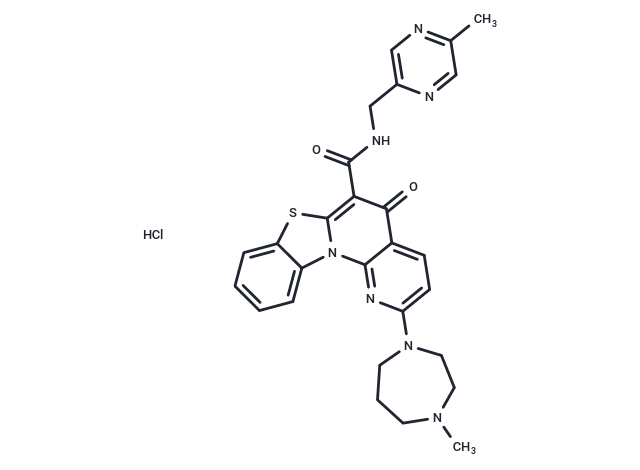 您的购物车当前为空
您的购物车当前为空
Pidnarulex HCl
一键复制产品信息Pidnarulex HCl is the salt form of CX-5461, a first-in-class non-genotoxic small molecule targeted inhibitor of RNA polymerase I (Pol I) that activates the p53 pathway without causing DNA damage. CX-5461 selectively inhibits rRNA synthesis by Pol I in the nucleolus, but does not inhibit mRNA synthesis by RNA Polymerase II (Pol II) and does not inhibit DNA replication or protein synthesis. Inhibition of Pol I results in nucleolar stress and release of ribosomal proteins (RP) from the nucleolus. The RP bind to Mdm2 and liberate p53 to orchestrate apoptosis in cancer cells. CX-5461 demonstrates a favorable preclinical profile, potently and selectively kills cancer cells, demonstrates robust in vivo efficacy in multiple models, and has demonstrated oral bioavailability in multiple species.

Pidnarulex HCl
一键复制产品信息Pidnarulex HCl is the salt form of CX-5461, a first-in-class non-genotoxic small molecule targeted inhibitor of RNA polymerase I (Pol I) that activates the p53 pathway without causing DNA damage. CX-5461 selectively inhibits rRNA synthesis by Pol I in the nucleolus, but does not inhibit mRNA synthesis by RNA Polymerase II (Pol II) and does not inhibit DNA replication or protein synthesis. Inhibition of Pol I results in nucleolar stress and release of ribosomal proteins (RP) from the nucleolus. The RP bind to Mdm2 and liberate p53 to orchestrate apoptosis in cancer cells. CX-5461 demonstrates a favorable preclinical profile, potently and selectively kills cancer cells, demonstrates robust in vivo efficacy in multiple models, and has demonstrated oral bioavailability in multiple species.
| 规格 | 价格 | 库存 | 数量 |
|---|---|---|---|
| 25 mg | ¥ 10,600 | 6-8周 | |
| 50 mg | ¥ 13,800 | 6-8周 | |
| 100 mg | ¥ 17,500 | 6-8周 |
产品介绍
| 产品描述 | Pidnarulex HCl is the salt form of CX-5461, a first-in-class non-genotoxic small molecule targeted inhibitor of RNA polymerase I (Pol I) that activates the p53 pathway without causing DNA damage. CX-5461 selectively inhibits rRNA synthesis by Pol I in the nucleolus, but does not inhibit mRNA synthesis by RNA Polymerase II (Pol II) and does not inhibit DNA replication or protein synthesis. Inhibition of Pol I results in nucleolar stress and release of ribosomal proteins (RP) from the nucleolus. The RP bind to Mdm2 and liberate p53 to orchestrate apoptosis in cancer cells. CX-5461 demonstrates a favorable preclinical profile, potently and selectively kills cancer cells, demonstrates robust in vivo efficacy in multiple models, and has demonstrated oral bioavailability in multiple species. |
| 分子量 | 550.08 |
| 分子式 | C27H28ClN7O2S |
| CAS No. | 2101314-20-7 |
| Smiles | Cl.CN1CCCN(CC1)c1ccc2c(n1)n1c3ccccc3sc1c(C(=O)NCc1cnc(C)cn1)c2=O |
| 存储 | Powder: -20°C for 3 years | In solvent: -80°C for 1 year | Shipping with blue ice/Shipping at ambient temperature. |
计算器
体内实验配液计算器
以上为“体内实验配液计算器”的使用方法举例,并不是具体某个化合物的推荐配制方式,请根据您的实验动物和给药方式选择适当的溶解方案。
剂量转换
对于不同动物的给药剂量换算,您也可以参考 更多





 还可以
还可以
 |
|